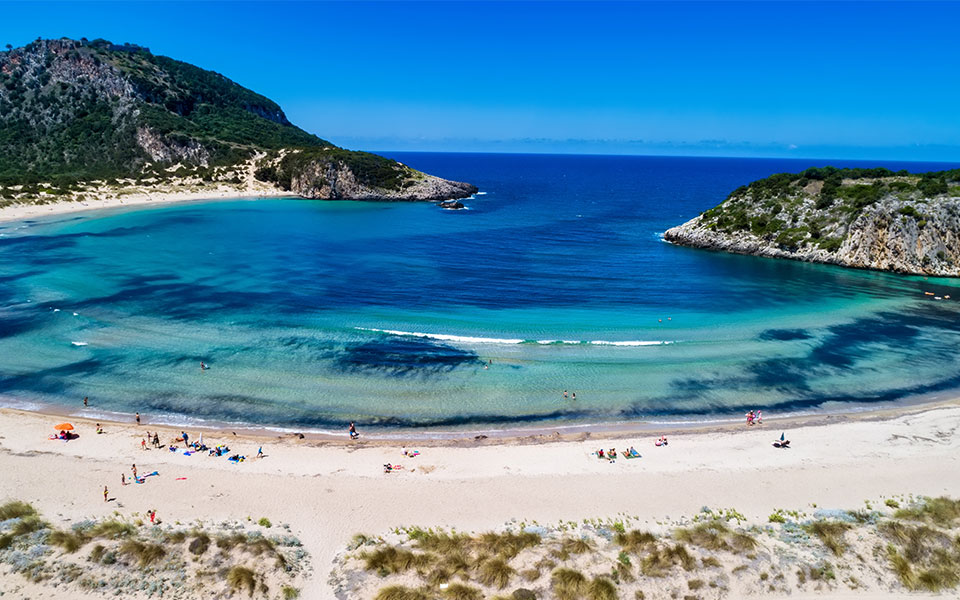Ancient Messene, Messinia
Ancient Messene was an important cultural center in antiquity and continued to be a major political and artistic center even after the Roman conquest of Greece in 146 BC. Upon entering the archaeological site, you will see the Theatron, followed by the Agora, the Asklepion with a series of rooms that housed statues representing Apollo and the Muses, the city of Thebes, Hercules and Epaminondas, Tyche (Fortune) and Artemis, as well as the bath houses, the Vouleftirion (Assembly Hall) and Ekklesiasterion. As you walk down the hill you will see the Roman Mansion on the left and the Stadium, Gymnasium, Palaestra and Mausoleum further along. Your visit will take about 3 hours, and it’s worth driving a few kilometers to see the Arcadian Gate, one of the two entrances of Ancient Messene – the country road passes just underneath it.
Where to swim
Ancient Messene is located in the interior of the regional unit of Messinia, but its position is also strategic for accessing the best beaches in the area. At a distance of 35km you’ll find the Kalamata Beach, followed by Verga, Mikra Mantineia and other gorgeous coastlines of the Messinian Gulf. In the opposite direction, in the northwest, you will arrive at the famous Voidokilia Beach – it may be 65km away, but it’s well worth the effort.
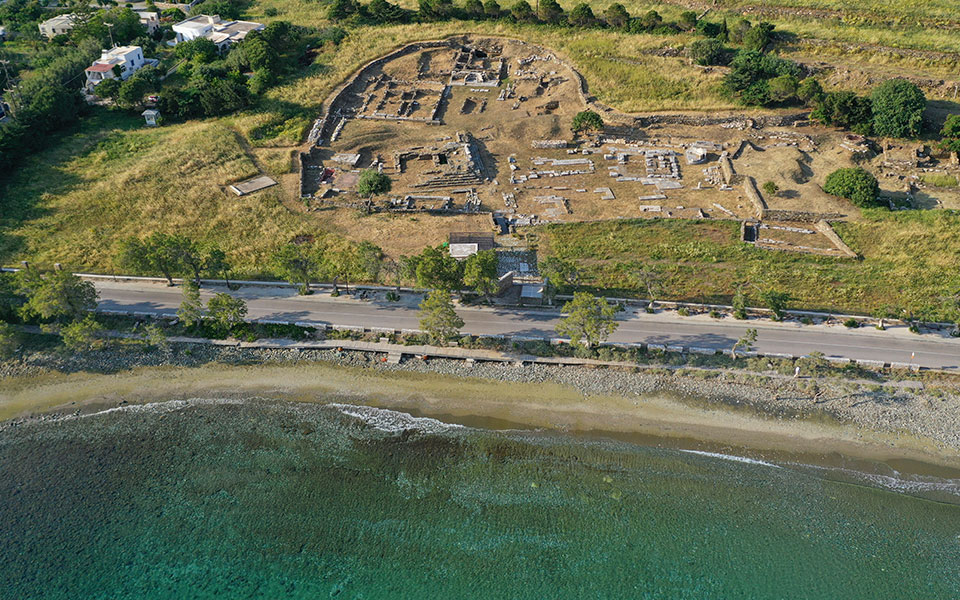
© Shutterstock
Sanctuary of Poseidon and Amphitrite, Tinos
The sanctuary of Poseidon and Amphitrite is the only sanctuary in the Cyclades that was dedicated to the gods of the sea. It is located – as expected – next to the sea in the Kionia area, a few kilometers outside of the Hora, and was in operation between the 4th and 3rd centuries BC. Its reputation was extensive, with pilgrims coming to the island to pay their respects from far off places such as Africa, Asia Minor and southern Italy. Today, a little bit of imagination (and some guidance from the head site guard) are needed to fully comprehend what it looked like in antiquity, as most of the monuments have been destroyed.
Where to swim
The easiest option is Kionia, located almost next to the archaeological site. This is a very popular beach in Tinos, not so much because of its beauty but rather its location. Approximately 8km away you will also find Apigania, one of the best beaches on the island.
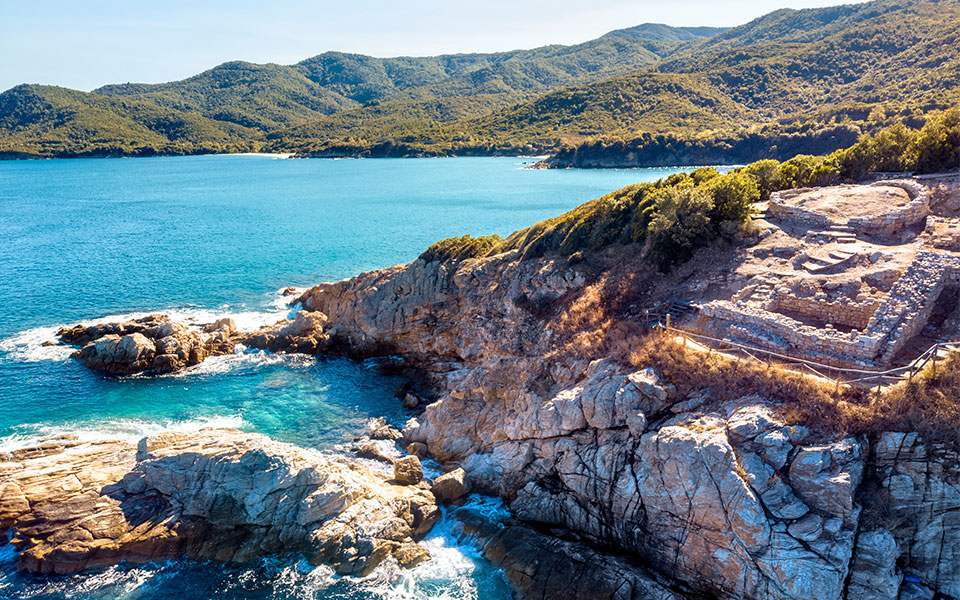
© Shutterstock
Ancient Stagira, Halkidiki
Founded in the 7th century BC by Ionians from Andros, Ancient Stagira was the birthplace of Aristotle, born there in 384 BC. As you explore the monuments of the acropolis, including the ruins of the portico, agora, and Archaic temple, you will marvel at the thought of treading in the footsteps of one of history’s greatest philosophers. In addition to history buffs, the site attracts many hikers as it is incorporated in the Aristotelian Walk. Opposite Ancient Stagira you’ll see the islet of Kapros, shaped like a wild boar, where it is believed Olympias, the mother of Alexander the Great, was exiled.
Where to swim
Ancient Stagira was a coastal city, thus the archaeological site today is surrounded by beaches (Sikia, Kefalas), so do not be surprised to see people in their swimsuits wandering around. Very close to Ancient Stagira you will find the beaches of Proti Ammoudia (towards the south) and Olympiada (in the north).
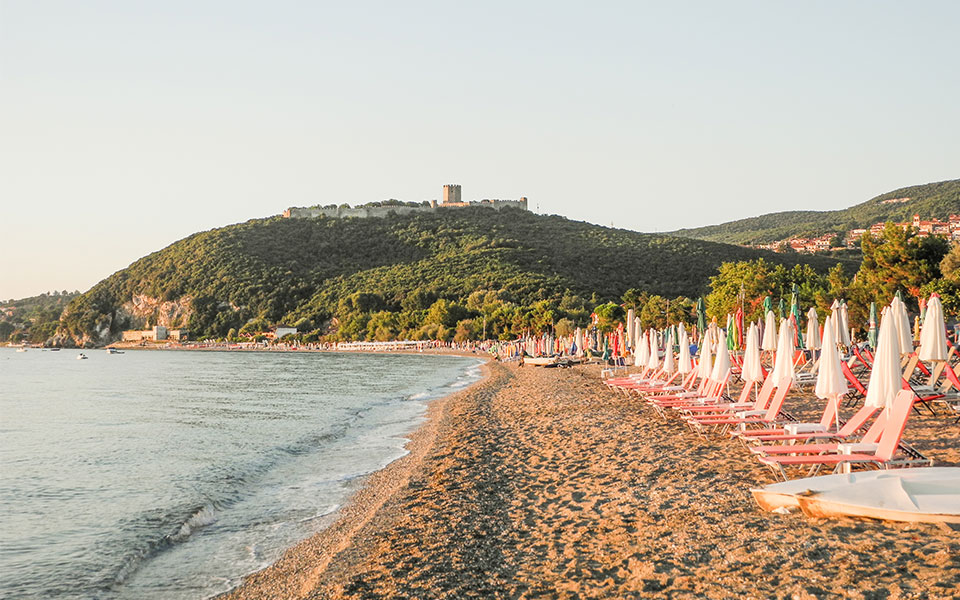
© Shutterstock
Dion, Pieria
The archaeological site of Dion, an expanse of 1500 square kilometers surrounded by kiwi plantations, is an exciting biotope with dense vegetation and rich fauna. In practice, the road divides the site in two. After entering and walking along the cobblestone path you will come to the Sanctuary of Demeter, the oldest on the site. Behind stands the Sanctuary of Zeus Hypsistos, while on the right are the ruins of two theaters, one Hellenistic, the other Roman. On the east, where the Sanctuary of Isis is located, is also where the majority of the archaeological ruins are concentrated, which reveal important information about the ancient city. Walls, public baths, odeons, an aqueduct, houses and mansions formed a large building complex. The southern section is dominated by the Villa of Dionysus, where excavations began in 1982.
Where to swim
You will find many beaches in Pieria stretched along an expanse of dozens of kilometers, along the eastern coastline, sandy but also with pebbles. The beaches of Plaka Litohorou (14 kilometers from Dion), Skotina (23 kilometers from Dion) and Makrigialos (38 kilometers from Dion) are some characteristic examples.
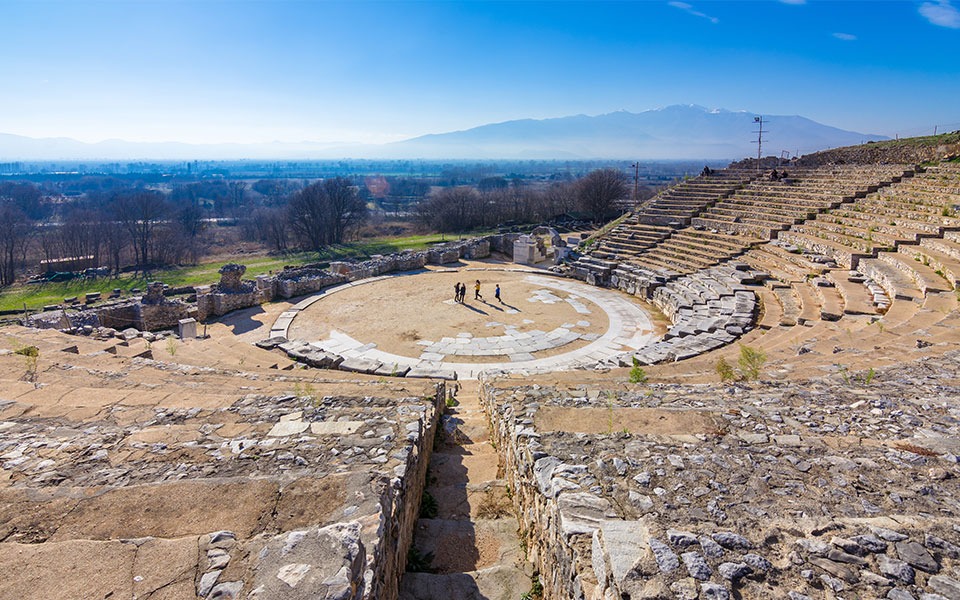
© Shutterstock
Ancient Philippi, Kavala
Ancient Philippi is an archaeological site where the connection between antiquity and the Byzantine Empire is clear, and the transition from paganism to Christianity literally unravels before your eyes. The ancient city was founded in 360 BC as a colony of the Thassians, with the name of Krinides (“Fountains”). It was soon conquered by the Philip II of Macedon (Alexander the Great’s father) and named Philippi in his honor. Today some of the most recognizable monuments include the ancient theater, the market (the Marcellum) and the center of government during the Roman period (the Forum). The Forum was actually built between the commercial road and the Via Egnatia. Nearby you will also find Basilica B built over the palaestra, dating from 550 AD with its architectural influences from Constantinople. The basilica dedicated to the Apostle Paul is also noteworthy, created near a subterranean Macedonian tomb and a shrine dedicated to a Cabeirian mystic (underworld deity). At some point it was transformed into an octagonal church, the Octagon, one of the most important monuments at Philippi.
Where to swim
Ancient Philippi is located 16km from the city of Kavala, where locals begin frequenting the area’s beaches from the early spring. Of course, during the summer months most head further afield to the beaches just above the Gulf of Kavala: Ammolofi, Vrasidas, Nea Iraklitsa, Aspri Ammos, and Keramoti are some of the more well-known options.

